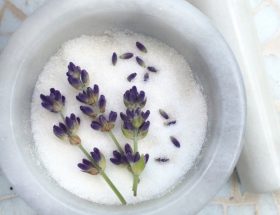This post may contain affiliate links. Any sales made through such links will reward me a small commission – at no extra cost for you!
What is sensitive skin, how you can recognize it, what causes your skin’s sensitivity and how best to treat it…
Only someone who regularly deals with skin sensitivity knows how much it can affect every aspect of your life.
It’s not only about finding the right skincare products. You also need to be careful about what you eat, what you wear, what detergent you are using and a zillion other things people with normal skin don’t even think about.
In the end, all the things you need to avoid and be careful about annoy you more than the occasional skin redness and itchiness.
Yet, you can’t just stop worrying and checking ingredients twice because the “occasional redness” can quickly develop into swelling, flushing nightmare that not only doesn’t look good, but can make you scratch until you bleed.
Most people will at some point experience some form of skin sensitivity. But if your skin’s persistently acting up, you may want to check down below all the causes and symptoms of sensitive skin, as well as the best approach to treating it.
What Causes Sensitive Skin?
Though in many cases you can’t control the triggers and things that make your skin sensitive, there are a couple of things you can do (read: avoid) to limit the damage. Go through the following list of causes of sensitive skin and think what might be causing your skin’s sensitivity:
- allergies;
- stress and hormonal changes;
- dry skin and some severe skin conditions, like eczema or psoriasis;
- external factors, like low air humidity, pollution, climate…;
- UV damage;
- allergy medicine, Acutane, Retin-A and some other medicines;
- harsh cosmetic and cleaning products and ingredients;
- rough-grain scrubs or exfoliating your skin too often;
- lack of sleep;
- cigarettes and consuming too much caffeine or alcohol;
- food – weather increased sensitivity to a certain food or simply poor, low-quality diet.
What Are the Symptoms of Sensitive Skin?
#1 Redness
If your skin flushes easily or you have red patches on your skin, that is a pretty obvious sign of sensitive skin. Most people experience some redness every once in a while, but if your skin is sensitive, it will react often and to almost anything.
#2 Itchiness
Another pretty common sensitive skin symptom is itchy sensation and tight, uncomfortable feeling. Like with redness, it may not have an obvious direct cause.
#3 Rash
You are prone to rashes and you often notice tiny red bumps on your skin. Even a small change in your routine can lead to some major reactions.
#4 Breakouts
Whether you break out because you often touch your skin because of the uncomfortable sensation, or because your skin is dry and starts to produce more oil, clogged pores and acne can often be spotted in people with sensitive skin.
#5 Frequent reactions to skincare products
Alcohol, salicylic acid, benzoyl peroxide, retinol and AHAs can cause some redness even if you don’t have sensitive skin. But if you react to almost anything – cleansers, toners, moisturizers, makeup – then your skin is most definitely sensitive.
#6 Reactions to fragrance and color
Especially products that contain artificial scents and colors make your skin react. But even natural scents and some essential oils can severely irritate your skin.
#7 Dry patches
Your skin’s protective barrier is damaged or insufficient. Your skin is rough and flaky, irritated, often tight and sensitive to touch.
#8 Thin skin
Sensitive skin has fewer protective layers and it is often visibly thin and fragile. For example, you can spot broken capillaries on your nose and cheeks.
#9 Reactions to weather conditions
Even people with normal skin can develop some winter sensitivity, but it can usually be easily controlled with a quality moisturizer and a couple of ground skincare rules (Proper Winter Skincare Routine).
In people with sensitive skin, the problem is persistent, the skin is inflamed and it is much harder to take care of it. Also, sensitivity to the sun can be increased.
How to Treat Sensitive Skin
Some severe cases of skin sensitivity may require a visit to dermatologist. But, most mild and moderate skin reactions can be controlled and treated at home, and here’s how:
1. Avoid irritants
This one seems pretty obvious – if something is causing your skin to flush and itch, stop using it. This includes any cosmetics or makeup that usually makes your skin react. But it can also include cigarettes, coffee, alcohol, certain fabrics and even certain groups of food.
It may take some time for you to figure out what exactly all the triggers are, but just be persistent and soon you’ll know when, how and why your skin reacts and how to prevent it.
2. Heal and regenerate your skin
Your skin acts the way it does mostly because its protective barrier is weakened and insufficient to truly protect it and prevent the moisture loss. So, repairing and replenishing the barrier is one of your most important skincare goals.
Nourishing, organic, quality natural moisturizers (like coconut oil, sweet almond oil, jojoba oil, shea butter, cocoa butter…), honey, aloe vera gel and colloidal oatmeal are especially good in soothing irritated, inflamed skin.
3. The water temperature matters
Especially if your skin is dry and sensitive, you should avoid taking long, hot showers and washing your face with hot water.
Hot water removes all the necessary oils of your skin and that way it damages the skin’s barrier even further. It makes your skin dry, flaky, tight, uncomfortable and even more sensitive.
What you should do instead is use only lukewarm to moderately warm water. It is also very important to apply a moisturizer while your skin is still slightly damp, to lock in the moisture.
READ NEXT: THE DIFFERENCE BETWEEN HYDRATING AND MOISTURIZING
4. Sunscreen is a must
As we already said, damaged skin barrier can cause the skin to be sensitive, and the sun’s rays damage your skin even if you don’t burn but only tan. So, avoid the sun as much as you can and always wear a broad-spectrum sunscreen.
5. Control dehydration and pollution damage
Dehydrated skin can also be very sensitive and irritated. And if you live in a low humidity area or you spend a lot of time in rooms with AC or central heating, chances are your skin will get dehydrated pretty quickly.
A quality humidifier can prevent dehydration and keep your skin calm, plump and supple.
You can also try out some anti-pollution product, since all the toxins in the air make your skin sensitive, weak, dehydrated, dull and they even accelerate aging signs.
READ NEXT: 5 BEST DIY FACE MASKS FOR SENSITIVE SKIN
READ NEXT: DIY OATMEAL BATH BOMBS FOR SENSITIVE SKIN
















